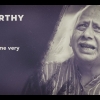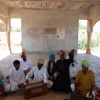Translation from the Bangla
Avishek Ghosh: Welcome, Khokonda. You have been singing qawwali for many years. When did your journey begin?
Khokon Qawwal: Since childhood I have been trained in this (Sufi) path by my grandfather who happened to be my Pir (spiritual master) too. Qawwali is a common practice among us who follow Sufism. I have been brought up in a musical environment. My uncle was a qawwali singer known as Rafiq Sabri Qawwal. Since I was studying in a school, I used to listen to qawwali, memorise them and perform among my friends. One day my uncle heard me singing and asked me to get trained in qawwali music. After getting the primary training from my uncle, I came across my Guru Pandit Samiran Bose who was trained in classical music by Ustad Salamat Ali, Nazakat Ali and Ustad Bade Ghulam Ali Khan. He lived in our neighborhood.
A.G.: Since when did you start performing in qawwali concerts?
K.Q.: I have been performing qawwali for over 25 years. Initially I used to travel with my uncle and perform when asked. This is how my hobby became my profession.
A.G.: Tell us something more about your grandfather.
K.Q.: Most people know only about the Qaderiya and Chishtiya orders. We belong to the Madariya order of Sufism. The founder of the Qaderiya orderwas Gaus Pak of Baghdad Sharif and Khwaja Gharib Nawaz was the originator of Chishtiya order. The mausoleum of the originator (Badiuddin Shah-i-Madar) of our order is in Makwanpur of Uttar Pradesh. He lived for 596 years. My grandfather, Syed Ghulam Mastan Tayefuri belonged to that order. He was so well educated that he even got an appointment letter from Abul Kalam Azad University but refused to pursue teaching as a profession and chose the life of a saint. My father was also a saint and now I am appointed as a sweeper in their holy shrines.
A.G.: So, you are the Sajjada Nashin (hereditary administrator) now.
K.Q.: I am here just to look after the shrine. You need a sweeper to clean up the place.
A.G.: Can you name some of the places where you have performed?
K.Q.: I have performed in many districts within West Bengal namely North and South 24 Parganas, Howrah, Hooghly, East and West Mednapore, Birbhum, Purulia, Bankura, Murshidabad and Burdwan. I have also performed in different states like Jharkhand, Odisha, Madhya Pradesh, Maharashtra, Assam and Tamil Nadu.
A.G.: Who is your audience?
K.Q.: My main audiences are those who have faith in the Sufi path. Actually, there are many types of songs popularly known as qawwali. For example, chhed (the popular romantic duet songs), songs used in cinemas and the songs performed in the Dargahs, all of them are called qawwali. There are audiences for all types of songs. I only sing Arifana and Sufiyana Qawwali. My listeners are those who have a taste for it.
A.G.: Do you only perform in the Dargahs/Mazars?
K.Q.: Yes, I perform in the mazaars and khanqahs (Sufi hospices).
A.G.: Can you please explain the structure of qawwali performances?
K.Q.: There are different subjects within qawwali. Generally, it starts with Hamd-sharif, a song in praise of God, followed by Naat-sharif in praise of the friend of God (the Prophet). After the Naat-sharif the songs in praise of the Sultan of the Walis (Abdul Qadir Jilani), Sultan of the Hind (Moinuddin Chishti) are sung respectively. Then one has to sing in praise of the saint in whose shrine the qawwali performance has taken place.This is the general rule, which is followed in most places. In some khanqahs, the singers are asked to start with Qawl.
A.G.: Can you please explain the significance of Qawl?
K.Q.: Qawl is sung in praise of Hazrat Ali Mushkil Kusha. In the Sufiyana Khanqahs, one has to start with Qawl because the Prophet said: ‘Whoever accepts me as Master, Ali is his Master too’, or ‘I am the city of knowledge and Ali is its door’. The devotees think that praising Ali pleases the Prophet and therefore pleases God. Sometimes where numerous singers are present, one has to follow the previous song and sing the next accordingly. In some places, the devotees request the singers to sing only in praise of their spiritual master. Apart from that there are songs based on arifana (esoteric knowledge) and tawhid (oneness of God).
Therefore, a qawwali performance starts with hamd in praise of God, followed by naat in praise of the Prophet, and qawl in praise of Ali Mushkil Kusha respectively. After that, manqabat is sung in praise of the Walis (holy saints). The songs are based on different themes, like muzahidana; the songs of chivalry, rindana, which deals with sharab (wine), Saqi (wine-provider) and botal (the container of wine); and arifana, which is the esoteric knowledge.
In the past, many old masters like Hazrat Amir Khusrau have composed numerous Sufiyana qalaams (poems). There were poets like Bahadur Shah Zafar, Allama Iqbal and Mirza Ghalib from whose poems the wise can pick a few for their purpose. In the past, there were masters like Kabir Das who have composed many Arifana qalaams. These songs are still sung in the Sufiyana mehfil (gathering) with great respect. They have shown us the true path and left their invaluable words of wisdom for the seekers.
Sometimes even the singers fail but the listeners grasp its meaning. That is why it is said that if you listen to some words of wisdom, tell others even if you do not understand it. This is the true purpose of qawwali. Another name of qawwali is Mehfil-e-Sama. When mere words of wisdom fail to make people understand the true path, it is presented with melody and rhythm so that everyone gets attracted towards it. The langar (communal meal) and music are the two important parts of a qawwali mehfil. People would sit and listen to the songs that contain the words of wisdom. The purpose of qawwali would be fulfilled if at least a few people could understand it. Music can either enrich or pollute the human mind. If music enriches the human mind, it is good, but if it does not, it is harmful.
A.G.: Did you ever face any social inhibition during your musical journey?
K.Q.: The people who think listening to music is a sin do not come to us or listen to our music. Actually, it depends on the perspective, just as an egg is oval from one side and round from the other.
A.G.: Sufis had come from outside and settled in Bengal at different times in our history. Their descendants have become a part of the Bengali society. Tell us a few words about your ancestors who came to Bengal from foreign lands many generations back.
K.Q.: Our ancestors came to Bengal about six to seven generations ago. Our genealogy shows that our ancestors moved from Arabia to Iran, and from Iran to Multan. The grandfather of my great-grandfather came to Bengal from Multan and settled here by marrying a Bengali woman. After so many years, we have become a Bengali family.
A.G.: Was music a tradition in your family since that time? Did you inherit music from your family?
K.Q.: I have not heard about any singers in our family before me. My grandfather used to play the esraj in his youth. Later he became a saint.
A.G.: Was there any Sufi saint in your family before your grandfather?
K.Q.: Yes, there were many saints in our family but no musicians.
A.G.: So, you belong to a Pir khandan (family lineage of saints).
K.Q.: My grandfather was a Pir and he passed his khilafat to my father. My grandfather got it from his maternal grandfather. Therefore, it is not a Pir khandan where khilafat passes from father to son through generations.
A.G.: When I met you for the first time, you were discussing the Persian poems of Hakim Sanai and Amir Khusrau. You are a Bengali but you perform Urdu qawwali in different parts of India. How did you learn languages like Persian and Urdu?
K.Q.: I learned how to pronounce the words and their meaning from many practising qawwali singers. I try my best but it is impossible to be the same as an Urdu speaker. However, the listeners are so kind that they accept it generously. Actually, it is not possible to sing like a person whose mother tongue is Persian or Urdu.
A.G.: You also sing qawwali in Bengali. I have a few field recordings of your Bengali songs in my personal collection. Do you have any idea how the qawwali was introduced in Bengali?
K.Q.: It was introduced by the Bengali-speaking disciples of Urdu-speaking saints who came to Bengal from outside. If a Bengali disciple passes 20 years with an Urdu-speaking master, he adapts the language naturally. Those people adapted a foreign language and introduced the ideas and emotions of Persian and Urdu poetry into the language of Bangla.
A.G.: Can you please mention some of the important composers of Bengali qawwali?
K.Q.: My grandfather Syed Ghulam Mastan Tayefuri initiated me in this path and I received further instruction from Syed Sariduddin Ahamad Chishti. Sadiruddin Chishti was a great saint who has composed numerous qalaams in both Bengali and Urdu in order to show the common people the true path. Another great composer of Bangla Qawwali was Piyara Irfan Chishti of Munshirhaat. He was a veteran singer. I have performed in many places with him. His son is also a composer and qawwali singer. However, the unparalleled composer of Bangla Qawwali in both aam and khas concerts was Abdul Karim. He was a disciple of my grandfather. There is a saying in Urdu that if someone does not know the qalaam of Hajrat Bedam Shah Warsi he is not a qawwal. Similarly, in Bengal if someone does not know the qalaam of Abdul Karim, he is not a Bangla qawwal. His compositions are still in demand in every Sufiyana concert.
A.G.: Where did he live?
K.Q.: He hailed from Jaypur of Howrah district. He was also a disciple of my grandfather. Wherever Bangla qawwali is performed, his contribution is still remembered with great respect by both the audience and the singers. Gulzar Sipahi is the most prominent Bengali composer of our time who has composed not only Sufiyana qalaam but also ghazal and chhed. Another composer who is worth mentioning is Bachchu Qader. However, many composers are still unknown to us. They are known only in their locality. For an example, Selim Chishty Nizami, father of Bachchu Qader, has composed many Sufiyana and Arifana qalaams.
A.G.: Both Sadiruddin Chishty and Abdul Karim have composed numerous songs. Are these songs published anywhere?
K.Q.: No, these songs have never been published in any magazine or as a collection of verses. Only the close companions and disciples of these masters have some verses in their personal collection.
A.G.: Qawwali is devotional music and at the same time, it is a popular form of entertainment. Which aspect is more important to you as an artist-cum-practitioner of this spiritual tradition?
K.Q.: As an artist, the singing is important, in that if I am able to hold my audience in thrall my art finds fulfilment. And behind the artist, there is another sense, that as a seeker it is important for me to draw other people who would understand the spiritual desire behind the emotion, and join this quest. See, that which is good will remain and endure as it has in the past. Everything has its place; each will value what is to her taste.












